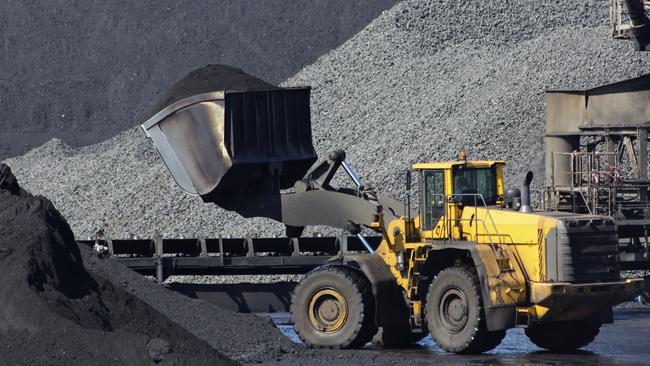Overturned loans ban offers lifeline to coal exporters
A ban on government-backed loans for onshore coal and resource export operations will be overturned.

A ban on government-backed loans for onshore coal and resource export operations will be overturned in the “national interest” to help fund billions of dollars in projects that are threatened by the growing reluctance of the major banks to back them.
Trade Minister Steve Ciobo will issue a direction this week to Australia’s export credit agency to broaden its mandate and extend loans to viable small-to-medium sized onshore resource ventures including coal projects and related infrastructure struggling to secure private-market finance.
Mr Ciobo said the decision was made in response to bullying of the retails banks by protesters and green shareholder activism that he claimed was damaging the country’s export potential. The reversal of a ban applied in 2014 on funding for onshore resource projects through the government’s Export Finance and Insurance Corporation (Efic) was urgently needed to fill a growing “market gap”, Mr Ciobo said.
The ANZ bank last week declared it was unlikely to finance a proposal to extend the life of AGL’s Liddell coal-fired power station in NSW on environmental grounds despite the warnings from the energy regulator that an energy price and supply crisis was looming due to the lack of reliable baseload power.
But Mr Ciobo said the problem was becoming more acute in Australia for otherwise viable onshore resource export projects, in particular coal ventures that face hostile campaigning from the green lobby and left-wing activist groups such as GetUp!, which threatened the Adani coalmine in Queensland.
Efic has reported an increasing number of resource projects facing difficulties in obtaining private-market finance either because of a higher commercial risk profile in the post-mining boom environment but also due to the recent rise in aggressive campaigning by activist groups putting pressure on the banks.
Mr Ciobo said that while Efic was still required to make assessments on the commercial viability of projects, the lifting of the ban for onshore resource projects would open new sources of finance to fuel a potential mini-boom in small-to-medium-sized projects.
“This is in response to the clear demand from the sector for support in light of increasingly, unfortunately, commercial lenders not being in this space,” Mr Ciobo said. “Anecdotally it is a consequence of high levels of shareholder activism and pressure applied by NGOs and others. Clearly, Australia’s national interest is being harmed as a result.
“We’ve got the potential to drive export income on the back of the commercial development of these projects.
“It is absurd to not have these projects move forward because commercial lenders are being bullied into not providing finance.
“It is logical to have the opportunity to have a commercial arrangement for finance from Efic.”
The decision to quarantine onshore resources from Efic, which operated under a charter to fill a market gap, was imposed in 2014 when bank lending for resources was strong. It lead to a situation where Efic was competing with the retail banks and funding projects by big players such as Santos.
“There was a recognised risk in 2014 to reduce Efic’s exposure in this sector. Clearly that has changed, and there is now a market gap. It is now much more difficult to secure private finance,” Mr Ciobo said.
“What we are doing is to ensure we are supporting economic growth and growing jobs in the resource sector. We’ve made sure that finance must be for commercial projects and must be export related … and it cannot come at the expense of SMEs.”
The mandate to Efic, which has a loan book of about $2.3 billion, will reverse the ban on loan financing for onshore resource projects while broadening the types of projects that could apply.
The changes would not duplicate other government support for resource projects such as those partially funded by the Northern Australia Infrastructure Facility.
The NSW government recently wrote to Mr Ciobo seeking federal assistance with Alkane Resources’ $1bn rare-earths project in western NSW, which would supply raw materials used in construction of renewable energy wind turbines and high-temperature jet engines.
Alkane’s technical director, Ian Chalmers, saidit was becoming more difficult to secure finance from retail banks. In Alkane’s case, the bankers’ reluctance was driven by a lack of commercial understanding of the sector rather than activism.
Mr Chalmers said the changes to Efic rules would open another potential source of finance for its project.
Mr Ciobo will this week direct Efic to change its mandate following amendments to its act, which passed the parliament last week with bipartisan support.
Minerals Council of Australia chief executive Brendan Pearson said many small-to-medium businesses were discouraged from trying to expand into export markers because of difficulties in trying to obtain securing trade finance.
“Efic plays an important role in supporting Australia’s economic growth prospects by meeting market gaps and market failures in the provision of export finance,” Mr Pearson said.
“The MCA welcomes the changes to Efic’s mandate, which will allow the agency to extend finance to domestic resources projects which have export potential but which may be struggling to obtain finance due to market gaps.
“It’s important to support businesses like these, because the start-up resources projects of today can be the export success stories of tomorrow. Expanding Efic’s mandate will help ensure new resources projects get off the ground and improve Australia’s ability to take advantage of future export opportunities.”



To join the conversation, please log in. Don't have an account? Register
Join the conversation, you are commenting as Logout